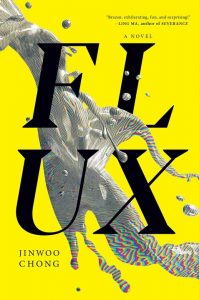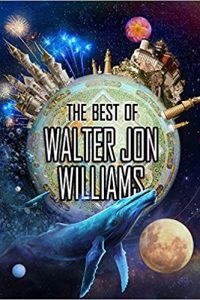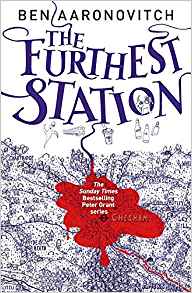Ian Mond Reviews Flux by Jinwoo Chong
 Flux, Jinwoo Chong (Melville House 978-1-68598-034-6, $28.99, 352pp, hc) March 2023.
Flux, Jinwoo Chong (Melville House 978-1-68598-034-6, $28.99, 352pp, hc) March 2023.
Central to Jinwoo Chong’s whip-smart, time-bending, and emotionally scarring debut novel Flux is Raider, a fictional mid ’80s cop drama named after its gravel-voiced, leather-wearing hero known for his Dirty Harry-like catchphrase, ‘‘give me a reason.’’ For eight-year-old Bo, Raider is his favourite show. He watches and rewatches his father’s old VHS tapes, drawn to the titular hero’s gives-no-fucks attitude, his torn leather jacket (Bo thinks of him as ‘‘Jacket Guy’’) and the show’s expansive (for the time) representation of Asian Americans:
We said more than unsubtitled Cantonese, we played more than kung-fu masters or dragon assassins. They even gave you a son, that six-year-old street urchin, Moto (season 2, episode 6, ‘‘Mercy for the Damned’’), who you rescued from a drug ring. I used to think I looked like that little kid. I’d imagine I was him and you were my real father come to take me away.
When Bo’s mother is hit and killed by a bus on her way to school, delivering bagged lunches for her sons, Bo, overwhelmed by guilt (he forgot the lunches on the kitchen counter), seeks comfort in episodes of Raider.
Twenty years later, Bo, now known as Brandon, has little sense of who he is. He’s not sure if he’s in love with Gill, who also happens to be his boss, he’s ambivalent toward his marketing job at a glossy magazine, and he’s estranged from his Korean culture and his father and brother. Even the one certainty in Brandon’s life, his adoration for all things Raider, has been unsettled by revelations that Antoin Haubert – the actor who played the title role – physically abused his wife and son. Then, on a single day, Brandon is made redundant (along with most of the magazine’s workforce), falls down an elevator shaft (which he survives), and encounters a ‘‘big-dicked stranger’’ who offers Brandon a role at Flux, a multibillion dollar start-up that purports to have developed a form of perpetual energy – a potential silver bullet to devastating power shortages across the globe. Skip a further two decades, and Flux has long shut down, the promise of a ‘‘Lifetime Battery’’ a pipe dream, and the founder, Io Emsworth, is in prison for the death of three employees. But with interest again piqued in the company and its shady operations, a documentary has reached out to a man named Blue whose experience at Flux left him with neurological damage and, it would seem, the ability to time travel.
It’s fitting that a novel that features a cult ’80s cop drama as its centrepiece shares qualities with some of the more memorable small-screen offerings of recent years. Brandon’s bewilderment about his role at Flux, where he has no memory of what he does each day, is reminiscent of the Apple series Severance. Similarly, his random ability to travel into his past recalls the second season of Russian Doll. Then there’s Io Emsworth, whose promise of a technology that proves to be all smoke and mirrors, followed by later revelations that she was never in control of her company, bears a striking resemblance to Elizabeth Holmes, Theranos, and the biographical miniseries The Dropout. Those influences only add flavour to a structurally complex and thematically layered novel. In keeping with his protagonist, who is unmoored from reality, Chong isn’t afraid to disorient the reader, to jump between past, present and future with next to no context (for example, it’s not immediately clear whether Bo, Brandon, and Blue are the same person). And while Chong’s depiction of time travel isn’t wildly original, how it’s presented is different and unexpected.
But what I found so effective about Flux is that for all its inventiveness – iincluding detailed and genuinely moving plot recaps of Raider to the extent I was tempted to look the fictional show up on Google– the novel’s themes ring out clearly. It’s a story about grief, trauma, and the powerful influence of pop culture, especially during childhood. And in telling that story, with a great deal of heart and passion, Flux adds to a growing canon of terrific speculative novels, including Charles Yu’s Interior Chinatown, Ling Ma’s Severance, and Grace Chan’s Every Version of You, that explore the tension between Western and Asian culture from a second-generation perspective.
My gut tells me that much like Emily St. John Mandel’s Station Eleven, Flux will find an audience with both literary and genre audiences. What I know for certain is that I will be eagerly anticipating whatever Jinwoo Chong writes next.
Ian Mond loves to talk about books. For eight years he co-hosted a book podcast, The Writer and the Critic, with Kirstyn McDermott. Recently he has revived his blog, The Hysterical Hamster, and is again posting mostly vulgar reviews on an eclectic range of literary and genre novels. You can also follow Ian on Twitter (@Mondyboy) or contact him at mondyboy74@gmail.com.
This review and more like it in the April 2023 issue of Locus.
 While you are here, please take a moment to support Locus with a one-time or recurring donation. We rely on reader donations to keep the magazine and site going, and would like to keep the site paywall free, but WE NEED YOUR FINANCIAL SUPPORT to continue quality coverage of the science fiction and fantasy field.
While you are here, please take a moment to support Locus with a one-time or recurring donation. We rely on reader donations to keep the magazine and site going, and would like to keep the site paywall free, but WE NEED YOUR FINANCIAL SUPPORT to continue quality coverage of the science fiction and fantasy field.
©Locus Magazine. Copyrighted material may not be republished without permission of LSFF.







